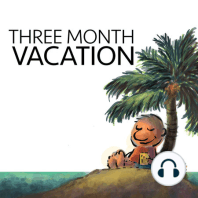1 min listen

The Amazing Power of the Challenge (And How To Fire Up Your Audience)
The Amazing Power of the Challenge (And How To Fire Up Your Audience)
ratings:
Length:
16 minutes
Released:
Mar 16, 2015
Format:
Podcast episode
Description
When you're making a presentation, how do you fire up your audience? There are many ways to get that Powerpoint or Keynote presentation going. But one of the most effective ways is to issue a challenge. The audience then waits for you to succeed (or fail). But you can't fail, can you? You're a magician who has practiced the tricks to perfection. This episode is about creating a challenge?then bringing the entire audience alive with the magic trick. ------------------ Useful Resources Email me at: sean@psychotactics.com / Magic? Yes, magic: http://www.psychotactics.com/magic / / Finish The Book Workshop: http://www.psychotactics.com/dc / Meet Me In Denver: http://www.psychotactics.com/denver / / For the Headline Report (Free): http://www.psychotactics.com/ / / -------------------- 00:03:48 Creating the Challenge 00:07:48 Space Between Challenge and Demonstration 00:09:04 Never Let The Heckler Win 00:11:01 Summary 0:12:52 Maryland Workshop on Info-products ------------------ Why Creating and Meeting Challenges Fire Up An Audience When you're sitting in a magic show, you don't doodle. You don't take out your pen, a sheet of paper and draw weird, funny squiggles. And that's because a magician creates action. And most of the action is centred around a challenge. And while a presentation is no magic show, there's a way to take your audience from doodle-zone to challenge-zone in a matter of minutes. So what is the challenge-zone? The challenge is something almost magical. Something that the audience would find hard to believe. Like for instance, a magician would make an elephant appear in the room. But the audience is skeptical—yet anticipating some action. This is the challenge-zone. In a world that's full of noise, the challenge immediately ramps up attention. Let's slip into an early example When I do the presentation for The Brain Audit, I will often start off telling the audience, that at about the 17 minute mark, I will get everyone in the room to think of the same question. To a skeptical audience, that seems impossible. How could any presenter know what every audience member is thinking, let alone making you think of the very same question? But the question is based on a trigger And if you've read The Brain Audit (which you should, if you haven't) you learn how to create the trigger. It's composed of the problem, solution and target profile. And when you string these three together, you get a single question, "What do you mean by that?". Once the trigger is sprung, curiosity takes over, and you have the "What do you mean by that?" question at the top of your mind. And that's just one example—so let's take another When I do a presentation on "Pricing", the challenge question is similar. I tell everyone that by the time I show them the price-grid, everyone will want to pay 15% more—instead of 15% less. And I'll create this desire for the more expensive option, without changing the core product. This means that if the core product is a workshop on ballroom dancing, the core product will stay the same. And yet, almost everyone in the room will choose the more expensive option. You see the elephant in the room, don't you? There's no elephant, but you as a magician are creating the challenge. And the audience loves the fact that there's a challenge coming up. What they love even more is that you're promising to "mess with the minds" of the entire audience. They think the guy next to them may be susceptible, but they're not going to fall for some silly trick. And this is what gives the challenge more power. The more skeptical they are, the more you're able to convert them from skeptics to fanatical fans. There's just one itty-bitty problem: How do you construct the challenge? The challenge must contain a method to get from A to B. It can't be just a concept. It must be something they can try for themselves. So for instance, there's this company called ioSafe. They make hard drives. And the beauty of their hard
Released:
Mar 16, 2015
Format:
Podcast episode
Titles in the series (100)
Six Steps to Getting Amazing Response From Clients: What's the secret to getting results? Amazingly it's not some online marketing trick or strategy. It's just plain old follow up. But how do you follow up? And how can you have a marketing strategy—especially for your small business? In this episode... by The Three Month Vacation Podcast